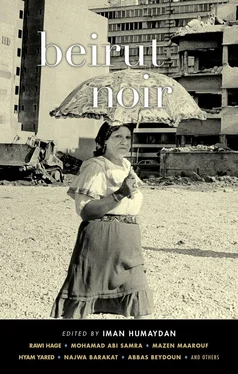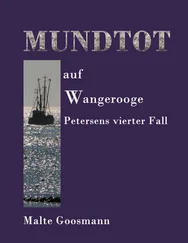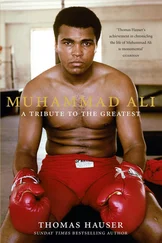The eye knows that my brother died because of his loss — that he withered and decayed, oppressed and wanting, missing both me and Ta.
What I can’t stand to think about is the certainty that he was — despite all that happened to him for so many years — still attached to Ta and loved him, unable to feel hatred or malice. When I think about that, it ignites remorse and defeat in me. I feel a burning fire inside myself, spreading through every inch of my insides, not leaving a trace on what originally were destruction and ruins.
Years have passed since this incident and the end of my sentence, which elapsed after five years since they determined mine was a “crime of passion,” as the lawyer told me. As though it was somehow dictated by my passion. My passion for whom? My passion for my brother? My passion for Ta? Or my passion for our small family, made up of the three of us, motivated by the fact that our families were busy and not looking after us. This led to a desire within us to find that missing care by providing it to others. So I didn’t search for an explanation for what happened, though it was the image of myself, scattered around like a doll whose limbs had been torn off, organs removed, and features smashed — that’s what worried me. That’s how my bodily functions and senses were all disrupted — my heart died, my intestines were squashed, my liver ripped out, and all that was left was an eye.
I am Mr. Kaaaa and I am nothing.
I sit down on the earth beneath the tree of melancholy, the lone tree, the last tree, my back against its trunk, my legs and feet sunken deeply into the grass and dirt. The plain lays out flat in front of me on a gentle slope, empty of anything that might hinder the coming of the wind. Not a pebble. Not a wisp of straw. Not a stick of wood. Leaves rustle above me and I know that I am about to expel my last breath. The eye looks up to the sky. A single cloud is passing by. A small cloud that doesn’t disturb the tyranny of the sun. I hear a crackle of laughter moving among the branches, a gentle breeze drops fresh buds on my face and head. I hear it prancing about frivolously, whispering before looking over on me from within the lacy leaves with two small eyes and a half-open mouth full of saliva. The eye trembles, delighted, quivering, tearing up, and fluttering before opening its mouth, filled with a voice tumbling down on the plain, touching the grass.
“Khaaa...”
Then a blink. And a dot. And disconnect...
Originally written in Arabic.
Eternity and the Hourglass
by Hyam Yared
Trabaud Street
“Time doesn’t exist. In fact, it never existed,” Hanane mumbles aloud while waiting her turn. It’s been nineteen years now that she’s waiting her turn in the cramped room on the second floor of the G Building on rue Trabaud, a narrow street on the East Side of Beirut.
While climbing the stairs two by two, she met the old lady who lives on the third floor. She pretended not to see her. Since she regained the use of her feet, she only takes the stairs. Upon reaching the landing, she looked at her watch. The hands showed 11:45. And we’ve reduced nothingness to this — she said to herself — to stupid hands on a watch. Time is nothing but an invention, an illusion. It’s not time that contains us — she tells herself — it’s we who perceive it. Time is emptiness that our consciousness makes measurable.
She wanted to share her discovery with her shrink. The prospect of talking about it makes her feverish. It was already 11:46 when she crossed the doorstep into the waiting room. She sat down, like always, on the armchair next to a coffee table, buckling under the weight of newspapers placed there to kill time.
The decor hasn’t changed in nineteen years. She bears a grudge against the patient before her who is encroaching on her time. Forty-five minutes of consultation. Not one minute more. She knows her shrink is inflexible, but today she’ll tell him — even if this means going over her allotted time.
She even wrote down the date of her discovery. January 20, 2011. She wrote it down right at the bottom of another list of other 20th of Januaries, noted in black marker. She finds it surprising that her discovery coincides with her list of 20th of Januaries. The sentence came to her while sleeping. Time doesn’t exist . Upon waking, she jumped out of bed, seized her list, scribbled January 20, 2011 , adding alongside it: Time doesn’t exist . The fact that the nonexistence of time can be written down as a date and time — specifically a January 20 — made her smile. She wanted to mark this event in pencil at the bottom of her list. That way, she could unseat time at will, she could wring its neck. She counts them. That’s the number: nineteen 20th of Januaries. From the date of her discovery, nothing will ever be the same. Suffering. Pain. In order not to live these things, she’ll now be able to think about how atemporal they are.
As soon as the door opens, she jumps up, puts her scrap of paper in her pocket, and smiles. The smell of his pipe wafting through the room comforts her. She knows it’s her turn. Every Wednesday she waits for her shrink to appear in the doorway. Waving his hand, he motions to her to come in. She gets up and walks through hurriedly. As soon as the door shuts on them, Hanane is more fearless than ever.
“There is no time, doctor, there’s just a hole. My body is an hourglass. The moment copulates in my blood over and over again. Each second is a woman giving birth. I give birth to time ad infinitum. Do you understand? I am time. Today we are January 20, 2011 — that is to say nowhere . Time doesn’t exist.”
Hanane almost jumps out of her chair while speaking. Of all of this man’s patients, she’s the one who intrigues him the most. And exasperates him the most too. In nineteen years, even if her motor skills are in the process of being normalized, she nonetheless seems hopelessly stuck in mental lethargy. He experiences a feeling of powerlessness that he drowns out by puffing on his pipe. This morning, Hanane watches him preparing his tobacco like he always does at the beginning of a session. While filling up his pipe, he observes his patient’s hands. Sometimes it seems to Hanane that he doesn’t even see her. That he looks past her. She wiggles impatiently and continues on:
“We all have it all wrong. It isn’t us who are captives of time, but the reverse. I live this space, therefore time is. Its measure is our consciousness. I’m telling you that in reality my body contains blood. Of the past. Of the future. Everything is an illusion. Atemporal, time is its own contradiction. It simply takes revenge and makes death flow through us. Do you hear me? Time is envious of the full power of our imagination through which it was born. It’s unbearable to be a captive. Do you remember the hourglass that my father gave us? He was proud of his purchase: an eighteenth-century hourglass that he bought for next to nothing from an antique dealer at the Basta flea market. Of all the many objects he bought while antiquing there, he only exhibited this one — putting it right in the middle of the living room on the mantelpiece above the fireplace. Now it has been nineteen years that this object of measurement sits proudly, uselessly, in the same place. We, too, remain in the same place. The sand does nothing. Neither does time. Vanity lies in how space is organized.”
And then she stopped talking.
Of course he remembers the hourglass. Whenever she called for extra sessions, it would inevitably be because she’d been in contact with the object on the very same day. Merely seeing the hourglass would trigger a crisis in her. This conical object, its sand enclosed by two glass vials and connected by a hole, anguished her. At first, she remained planted for hours in front of the door to the formal living room where the object could be found. She never crossed the room with her eyes open. Whenever she approached the hourglass, she tensed up, squinted, and breathed deeply before continuing on her way.
Читать дальше












